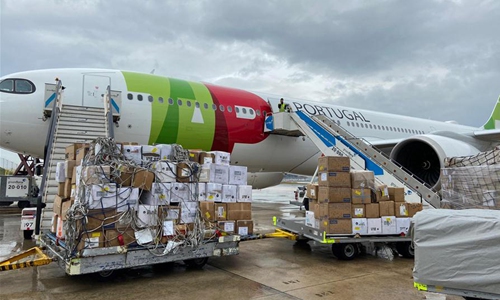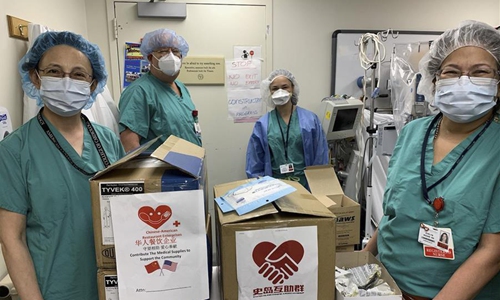'Mask diplomacy' hype unhelpful
China’s foreign aid in epidemic has no ulterior motives

Medical supplies delivered by China's Fosun Group arrive at an airport in Lisbon, Portugal, March 30, 2020. A batch of medical supplies delivered by China's Fosun Group, including 1 million face masks and 200,000 test kits, arrived in Lisbon from China on Monday, according to a press release by the company. Among the equipment, 70,000 units, including personal protective masks for healthcare professionals and nucleic acid detection kits from COVID-19, will be donated to the Portuguese government by the Fosun Group with the support of Fosun's subsidiaries in Portugal. (Xinhua)
Chinese officials, companies and analysts on Thursday called on the West to stop politicizing China's goodwill gestures in offering aid to countries devastated by the COVID-19 pandemic as some Western media and officials continue to hype China practicing so-called mask diplomacy and question China's intentions behind its humanitarian assistance to other countries like Italy and the US.As the largest manufacturer of masks, China has the ability to extend help to more countries while accusations against such a move based on distorted facts and political motives would not be helpful, analysts said.
Some media have recently published articles such as "Beijing's mask diplomacy draws backlash," while some critics claimed China is seeking to boost its image as a responsible global leader, and even criticized the Chinese government for using such tactics of providing medical supplies to divide the world. Meanwhile, somecountries like the Netherlands reported faulty mask imports from China, leading critics to say that the lack of quality control might upend such "mask diplomacy" and further damage China's global image.
The doubts on China's motives, some stemming from their political bias and ideological antagonism, are also part of a public opinion war against China as the pandemic continues to worsen worldwide. But there are also a significant number of people who see no ulterior motive behind donations of face masks from Chinese government and companies, and believe some issues arising from China's medical supply are all about supply and demand problems, and interpret it through China's role as the world's largest manufacturing hub and its tradition of helping other countries in need.
Those moves to smear China's efforts to help other countries amid this global fight against the pandemic won't stop China from continuing to provide necessary supplies, as the country would rather "render good for evil" than retaliate in this public opinion war and is committed to helping others combat this common invisible enemy, Chinese experts and officials said.
Despite rising doubts, China continues to send medical supplies to other countries, and Chinese embassies in European countries such as France and Italy have been allocating resources and distributing them to local people in need.
'Ulterior motive'
The West attaches a sense of moral legitimacy and authenticity to its own actions, as liberalism represents a "political truth," and in turn they associate China's actions and rhetoric with illegitimacy and always seek to look for an ulterior motivate or dismiss it as deception, for nothing that China can do can be "authentic" or true, Tom Fowdy, a British political and international relations analyst and a graduate of Durham and Oxford universities, told the Global Times on Thursday.
"This extends to interpretations of China in everything through aggressive geopolitical motivations and the aspiration of power, because it is assumed China's political system can project no authentic qualities or morality," he said.
Those voices which deliberately distort China's good intention are unfair, attempting to politicize China's goodwill gestures and prevent other countries from getting "too close" to Beijing, analysts said.
Some critics on social media said the country's humanitarian gestures are meant to cover up its complicity in the spread of the virus, and the US magazine The Diplomat even described the mass donation of masks and other supplies pivotal to restoring China's image in particular areas, especially for the purpose of pushing forward the Belt and Road Initiative.
Even when Chinese companies and business representatives are making donations to other countries, such gestures of goodwill have been mistakenly interpreted, which has become part of "evidence" in smearing China's efforts to fight the coronavirus battle. "Some have distorted the facts and misled the public, and such hostility has become a major challenge in this global fight," Li Haidong, a professor at Institute of International Relations of China Foreign Affairs University, told the Global Times on Thursday.
Companies such as Chinese e-commerce giant Alibaba and tech firm Huawei have drawn criticism after donating to some European countries, which see rapid increases in infection cases.
After Huawei donated millions of protective masks and gloves to virus-stricken countries such as Italy, Spain, the Netherlands, Lithuania, Poland, Greece and Switzerland, some critics said this move could be a ploy to win lucrative 5G contracts, Reuters said on Thursday. However, such a claim has been rebutted by EU industry chief Thierry Breton, who said there is no "quid pro quo" from these donations.
A Europe-based source close to the matter told the Global Times that Chinese companies like Huawei, which have been operating in local markets, have been actively taking part in fighting the pandemic, as the solidarity is needed now in combating this invisible enemy,, which is not a question about winner or loser.
Europe now records hundreds and thousands of infections while more countries adjusted their policies in pushing local residents to wear masks. For instance, Austria, the Czech Republic and Slovakia recently imposed mask-wearing while CNN said on Wednesday the US Centers for Disease Control and Prevention is reviewing its guidelines and may recommend general mask use.
Adjusting policies in urging the public to wear masks is expected to further drive the demand for face masks while the continuous resumption of work in China, as a large number of factories work around the clock to meet overseas demand for medical supplies, is playing vital role in protecting both ordinary people and frontline medics.

Volunteer Michelle Zhou (1st L) presents donations of medical supplies to staff members of Elmhurst Hospital in Queens of New York, the United States, on March 28, 2020. Chinese Americans and local operations of Chinese companies are making hard efforts to donate medical supplies to hospitals, police stations and local residents to ease shortage and help fight COVID-19 in the United States. (Xinhua)
Smear campaign
As a giant mask manufacturing hub with the most comprehensive supply chain for mask production, China makes over 50 percent of masks worldwide. Since the outbreak, more Chinese companies such as automaker BYD and household appliance maker Gree Electric transferred part of their production lines to increase output, and overall domestic production has surpassed 100 million a day, media reported.
The recovery of China's manufacturing capacity also ensures the continuous shipment of medical supplies to countries in need. However, questions have been raised on product quality, which are based on distorted facts and a disinformation campaign.
For instance, some media in the Netherlands reported the Dutch government had asked its hospitals to return 600,000 face masks it imported from China, claiming that the masks are faulty as they failed to meet safety requirements for frontline physicians and nurses. Chinese officials said on Thursday that an initial investigation revealed the masks were purchased by a Dutch procurement agent, and Chinese mask-makers had made it clear to their Dutch client prior to shipment, that the masks were intended for non-surgical use.
Chinese Foreign Ministry spokesperson Hua Chunying said that some media outlets hyped the quality issues involving Chinese medical product exports without verifying the facts, which is irresponsible and not conducive to international cooperation on coronavirus prevention.
Some online users even spread fake images about workers at a mask production line who used fabrics to polish their shoes, which is also seen as a malicious move to smear Chinese products.
"We don't mark up the price for foreign clients and sell them at cost. The masks we made are in line with the highest standards. We don't make a fortune on other people's suffering," Jin Xiaobo, CEO of Zhejiang Kaierhai Textile Garments Co, told the Global Times.
The company's production line can make about 400,000 disposable medical masks a day, and about 90 percent of the capacity is sold to Australia and Europe.
When the US needs more masks and has to increase imports from China, it is also an opportunity for Washington to call on American firms to bring back the massive manufacturing while defying made-in-China products, which, however, would unlikely be easily achieved, industry insiders said.
With more than 90 percent of raw materials sourcing domestically in China, even US mask makers such as 3M manufactures most of their masks in plants in China, industry representatives said.
"China only sources raw materials for melt-blown fabric, which is extracted and refined from petroleum, from the Middle East," Li Lin, general manager of Anhui Fumei Medical Company, told the Global Times.
He added that it would be extremely difficult for foreign companies to establish a local supply chain in a short time, and they still need to rely on raw materials from China.
"Unlike the US, China's humanitarian assistance has no political motives, which also has nothing to do with superiority of different political systems," Li said, noting that it's a complete mistake to interpret in through politics.
Chinese companies are working around the clock to make more medical supplies for those suffering from coronavirus and the responsibility as well as contributions of the Chinese people deserve respect instead of smears, Hua recently noted.
While the smear campaign continues, Chinese companies and individuals involved in donations and humanitarian assistance are also urged to protect themselves in cooperating with foreign partners, analysts said.
The Chinese commerce ministry also noted on Thursday that purchasing and usage problems of medical supplies should be settled through commercial negotiations.
Chinese companies won't take the blow without cause. "If these are problems identified by medical experts, companies need to take them seriously, but if those are hyped by politicians, they are not fair judgments," Li noted.